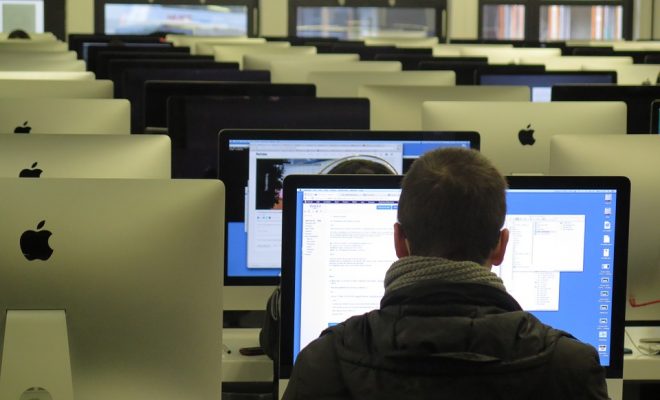Using blended learning to increase reading proficiency in early grades

With schools facing increasing pressure to have their third-graders read at grade level, technology can be a huge help.
A guest post by Stacy Hurst
Each year the challenge remains for teachers in grades K-3 to effectively teach a classroom of students whose individual reading abilities and instructional needs vary greatly. To add to the challenge, a growing national emphasis on third-grade reading proficiency has highlighted the need for high-quality, individualized instruction in grades K-3. Fortunately, through blended learning, teachers can use both face-to-face instruction and technology to maximize the reading proficiency of each student.
What is Blended Learning?
Blended learning is an instructional delivery method that leverages the effective use of technology to maximize (not replace) quality teacher instruction by increasing the amount of time each student is engaged in learning. Blended learning can be used in K-3 classrooms to increase the number of students reading on grade level by the end of third grade.
Examples of Using Blended Learning Models for Literacy Instruction
There are multiple models of blended learning for students of all ages. Two models that are practical in grades K-3 are the “Station Rotation” and “Lab Rotation” models. An important thing to note in the examples described below is the relationship between what is being taught during face-to-face instruction and how the smart use of technology maximizes that instruction in order to increase student learning.
Station Rotation
Station Rotation (a.k.a. Centers) is very common in K-3 classrooms. The goal of this model is to engage students in meaningful, sustained, individualized learning while the teacher is instructing small groups of students. In this model, not every station requires the use of technology. Five examples of stations that do use technology are the following:
One station in a blended learning classroom may be a computer center where students receive individualized instruction in foundational reading skills. For students who need a review, the teacher may assign a lesson on the software that has already been taught during whole-class instruction; for struggling students who would benefit from a preview of the upcoming lesson, the teacher may assign material that hasn’t been taught yet.
Another station might involve students reading books on a tablet (preassigned to match their level) and responding to questions to demonstrate comprehension.
For spelling and/or vocabulary, students may watch a video of their teacher introducing the words for the week and explaining the cloze passage that they will complete at this station using those words.
Another station could be used to assess various aspects of a student’s reading ability. Students may take a computerized test to identify their current reading level, or complete the weekly spelling test by following along with a prerecorded video of their teacher allowing them to pause and repeat as needed. With the help of an adult, a student could be recorded discussing a book they’ve read or reading a book out loud for the teacher to analyze later.
Finally, the most important station in this model would be small-group, differentiated instruction lead by the teacher. In this station, a teacher can use the results from assessments (computerized or not) to group students and streamline differentiated instruction for each group.
Lab Rotation
The Lab Rotation model takes place in a computer lab supervised by a teacher. In this model, the teacher can use computer lab time to efficiently assess what is being taught in the classroom. One example would be the Check Ups found in the Reading Horizons Discovery software. Students take a quick assessment of the foundational skills taught in the previous days’ instruction. The results help the teacher to determine whether or not the class as a whole is ready to move on to the next lesson. The software helps teachers identify students who would benefit from small group instruction on specific foundational skills and provides resources for teaching those skills.
Other activities in the computer lab would include individualized software instruction, taking a Lexile assessment or chapter test, or reading and responding to what they have read. The key is not to just fill time but to keep students engaged in learning content that supplements and informs teacher instruction.
Benefits of Using Blended Learning for Literacy Instruction in Grades K-3
There are many benefits of using a blended learning model for early literacy instruction. Here are six.
- It increases the amount of time students are engaged in learning as well as the teacher’s ability to teach each student on his or her level.
- It makes it easier for teachers to more immediately and effectively intervene when necessary.
- It provides more time throughout the day for targeted instruction and feedback at a pace that is appropriate for each student.
- In addition to familiarizing students with technology who may not have the opportunity otherwise, it also provides a model for all students to use technology for learning as opposed to mere consumption.
- It extends opportunities for learning beyond the classroom. Students can access software at home, during the summer, etc.
- It can decrease the amount of time a teacher spends administering tests and grading papers, thereby increasing the amount of time to prepare instruction.
Blended learning allows K-3 teachers to efficiently instruct and closely monitor each student’s literacy development. Quality instruction and intervention in earlier grades can drastically increase the number of proficient readers in third grade. Blended learning can help teachers ensure that each of their students will have a solid literacy foundation on which they can continue to build.
___
Stacy Hurst taught first grade before becoming a literacy coach and reading specialist. She has extensive experience coordinating interventions for struggling readers in grades K-12 and has taught English Language Development classes to elementary students and adults. Stacy is currently working as a curriculum specialist for Reading Horizons and is a co-author of the Reading Horizons Discovery curriculum materials.





